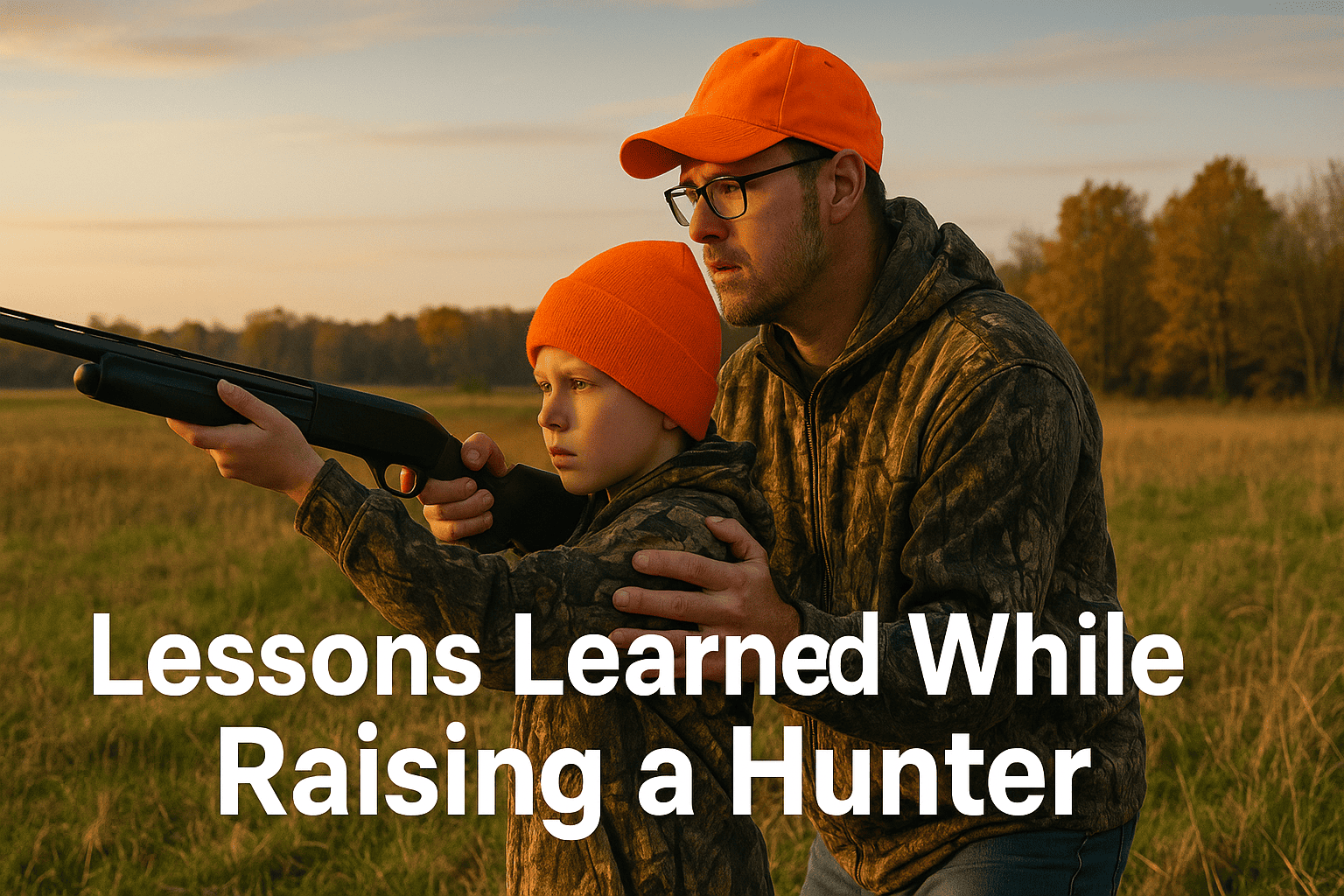Lessons Learned While Raising a Hunter

Raising a hunter is an endeavor filled with rich experiences and invaluable lessons. Whether you’re a parent guiding your child or a mentor coaching a novice, the journey imparts wisdom that extends beyond the hunt itself. This article explores the lessons learned while raising a hunter, providing insights into the essential skills, ethics, and values that hunting instills.
Table of Contents
- Introduction
- Understanding the Basics
- Building Patience and Discipline
- Connecting with Nature
- Developing Skills
- Ethics and Responsibility
- Emotional Growth and Bonding
- Advanced Hunting Techniques
- Conservation and Wildlife Management
- Gear and Technology
- Passing on the Legacy
- Frequently Asked Questions (FAQs)
- Conclusion
Introduction
Raising a hunter is more than teaching someone how to track and shoot game; it’s about fostering a deep respect for nature, understanding the ecosystem, and developing essential life skills. Whether you’re starting with a young child or a novice adult, the journey is filled with teachable moments that extend beyond the hunting field. This article will guide you through the significant lessons learned, ensuring a rewarding experience for both the mentor and the hunter.
Understanding the Basics
The Importance of Safety
Safety is the cornerstone of hunting education. Before stepping into the woods, it’s crucial to understand and teach the importance of handling firearms and other hunting equipment safely.
- Firearm Safety: Always treat every firearm as if it’s loaded. Ensure the hunter knows how to properly load, unload, and carry the firearm.
- Situational Awareness: Always be aware of the surroundings. Identify your target and what lies beyond it to prevent accidents.
- Use of Safety Gear: Equip hunters with appropriate safety gear like blaze orange clothing to increase visibility to other hunters.
Essential Hunting Gear
Having the right gear is essential for a successful hunting trip. Here’s a list of basic hunting equipment that every hunter should be familiar with:
- Firearms or Bows: Depending on the type of hunting, choose between rifles, shotguns, or bows.
- Ammunition or Arrows: Ensure a sufficient supply and understand the type needed for the game.
- Clothing: Dress appropriately for the weather and terrain. Layers and camouflage are often necessary.
- Field Gear: This includes items like binoculars, knives, first aid kits, and game calls.
- Backpack: To carry essentials such as water, snacks, and additional gear.
Building Patience and Discipline
The Role of Patience
Hunting teaches one of life’s greatest virtues: patience. The wait for the right moment to take a shot, sometimes in adverse weather conditions, requires an immense amount of patience.
- Waiting for the Right Shot: Teach the hunter to wait for a clean, ethical shot rather than rushing, ensuring a humane kill.
- Handling Disappointment: Not every hunt will result in a catch. Learning to handle disappointment builds resilience.
Discipline and Consistency
Discipline in hunting is about consistency in practicing skills, maintaining gear, and following hunting regulations.
- Regular Practice: Consistent practice improves accuracy and confidence.
- Gear Maintenance: Regularly check and maintain hunting equipment to ensure it’s in working order.
- Following Regulations: Adhering to hunting laws and seasons shows respect for the sport and the environment.
Connecting with Nature
Respecting Wildlife
A true hunter respects the animals they pursue. This respect extends to the environment and the ecosystem.
- Leave No Trace: Teach the principles of leaving no trace to minimize the impact on the environment.
- Conservation Efforts: Participate in conservation programs and understand the role hunting plays in wildlife management.
Understanding Animal Behavior
Successful hunting often depends on understanding the behavior and habits of the game.
- Tracking: Learn to identify animal tracks and signs.
- Habitat Knowledge: Understand where and when certain animals are likely to be found.
Developing Skills
Marksmanship
Accuracy is critical in hunting to ensure a quick, humane kill.
- Practice Shooting: Regularly practice shooting at a range.
- Use of Scopes and Sights: Teach the proper use of scopes and sights to improve accuracy.
Tracking and Scouting
Tracking and scouting are essential skills for locating game.
- Reading Signs: Learn to read animal tracks, droppings, and other signs.
- Scouting Locations: Scout potential hunting spots ahead of time to understand the terrain and animal movement.
Ethics and Responsibility
Hunting Laws and Regulations
Understanding and adhering to hunting laws is essential for legal and ethical hunting.
- Licensing: Ensure all necessary licenses and permits are obtained.
- Bag Limits: Follow bag limits and other regulations set by wildlife authorities.
Ethical Hunting Practices
Ethical hunting ensures the sustainability of wildlife populations and the integrity of the sport.
- Fair Chase: Follow the principles of fair chase, ensuring the game has a fair chance of escape.
- Humane Practices: Strive for quick, humane kills and utilize as much of the game as possible.
Emotional Growth and Bonding
Mentor and Mentee Bonding
Hunting provides a unique opportunity for mentors and mentees to bond over shared experiences and challenges.
- Shared Experiences: The time spent together in nature fosters a deep connection.
- Passing on Traditions: Mentors pass down traditions and knowledge, creating a sense of continuity and heritage.
Coping with Success and Failure
Hunting teaches valuable lessons about success and failure, and how to handle both gracefully.
- Celebrating Success: Celebrate successful hunts and the skills that led to them.
- Learning from Failure: Use unsuccessful hunts as learning opportunities to improve skills and strategies.
Advanced Hunting Techniques
As the hunter gains experience and confidence, introducing more advanced techniques can further enhance their skills and enjoyment of the sport.
Stalking and Ambushing
Stalking and ambushing are advanced techniques that require a deep understanding of animal behavior and the environment.
- Stalking: Move silently and slowly, always staying downwind to avoid being detected by scent. Use natural cover and shadows to stay hidden.
- Ambushing: Set up in a location where game is likely to pass, such as near a water source or feeding area. Remain still and patient, waiting for the right moment to take a shot.
Using Game Calls
Game calls can attract specific animals by mimicking their sounds.
- Types of Calls: Learn to use different calls such as grunts, bleats, and rattles depending on the game you’re pursuing.
- Timing and Technique: Practice the timing and technique of using calls to make them sound realistic and effective.
Advanced Tracking
Advanced tracking skills help in locating game and understanding their habits.
- Track Aging: Learn to determine the age of tracks to know how recently an animal was in the area.
- Interpreting Signs: Look for additional signs like broken branches, droppings, and bedding areas to build a complete picture of the animal’s movements.
Conservation and Wildlife Management
Teaching conservation and wildlife management is crucial for responsible hunting.
Understanding Ecosystems
Hunters play a role in maintaining the balance of ecosystems.
- Population Control: Hunting helps manage wildlife populations, preventing overpopulation and ensuring species health.
- Habitat Preservation: Educate about the importance of preserving habitats for wildlife sustainability.
Participating in Conservation Efforts
Encourage active participation in conservation.
- Join Organizations: Participate in local and national wildlife conservation organizations.
- Volunteer: Get involved in habitat restoration projects and other conservation initiatives.
Gear and Technology
Modern hunting gear and technology can enhance the hunting experience.
Advanced Optics
High-quality optics can make a significant difference in spotting and identifying game.
- Binoculars and Spotting Scopes: Invest in good binoculars and spotting scopes for clear, long-distance viewing.
- Rangefinders: Use rangefinders to accurately measure the distance to your target.
GPS and Mapping Tools
Technology can help navigate and plan hunts more effectively.
- GPS Devices: Use GPS devices to mark locations, track movements, and ensure you can find your way back.
- Mapping Software: Utilize mapping software to study the terrain and plan your hunting strategy.
Trail Cameras
Trail cameras can provide valuable insights into game movement patterns.
- Setting Up Cameras: Place cameras near trails, feeding areas, and water sources.
- Interpreting Data: Use the data collected to plan your hunts and understand animal behavior.
Passing on the Legacy
Sharing the passion for hunting with the next generation ensures the tradition continues.
Mentoring New Hunters
Becoming a mentor is a rewarding way to share your knowledge and passion.
- Lead by Example: Demonstrate ethical hunting practices and respect for wildlife.
- Provide Guidance: Offer support and guidance in all aspects of hunting, from safety to skill development.
Storytelling is a powerful way to pass on knowledge and traditions.
- Campfire Stories: Share hunting stories around the campfire to inspire and educate.
- Documenting Hunts: Keep a journal or create videos to document and share your hunting experiences.
Frequently Asked Questions (FAQs)
1. What age is appropriate to start teaching hunting?
There’s no specific age; it depends on the child’s maturity and interest. Typically, children can start learning basic concepts around age 8-10.
2. What is the most important safety rule in hunting?
Always treat every firearm as if it’s loaded. This rule forms the foundation of all other safety practices.
3. How can I keep a young hunter interested in the sport?
Make the experience enjoyable by focusing on the adventure and learning aspects rather than just the outcome of the hunt.
4. What should a beginner hunter focus on first?
Beginner hunters should focus on learning firearm safety, basic hunting skills, and understanding local hunting laws and regulations.
5. How do I teach ethical hunting practices?
Lead by example. Demonstrate respect for wildlife, follow all regulations, and emphasize the importance of fair chase and humane kills.
Conclusion
Raising a hunter is a rewarding endeavor that imparts numerous life lessons. From patience and discipline to a deep respect for nature and wildlife, the journey shapes both the mentor and the hunter. By focusing on safety, skills development, and ethical practices, you can ensure a positive and fulfilling hunting experience. Happy hunting!







